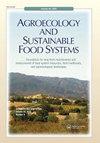尼日利亚山药种植的社会文化和生产力关系
IF 2.6
3区 农林科学
Q1 AGRICULTURE, MULTIDISCIPLINARY
Agroecology and Sustainable Food Systems
Pub Date : 2023-07-12
DOI:10.21323/2618-9771-2023-6-2-139-147
引用次数: 0
摘要
山药生产的社会文化结构在很大程度上受到传统、宗教、信仰、禁忌、神话、灵性和社会关系的影响。Obudu社区是研究这些结构对山药生产力和可持续性影响的重点。通过60次访谈、2次公开会议、3次焦点小组讨论、当地举报人、查阅文献(包括二手文献和灰色文献)和敏锐观察等方式收集数据。我们的研究结果揭示了一系列的指数受访者的看法作为衡量生产力。土著和“老年”人口中的大多数在他们的农业实践中更加保守,表现出对传统做法和生态健康的更深的依恋,物质生产力和产量产出的表现下降,尽管不是那么显著。社会流动的非本地人和年轻的人口群体对现代农业方法持开放态度,目标是薯蓣块茎的数量和吨数,而不是那么热衷于使可持续生产和人类生存成为可能的生态系统的整体健康和完整性。结果强调需要超越物质生产率的提高,因为应该探索其他非物质生产率指标。应进行更严格的定量和长期趋势分析,以评估与研究区自然生态健康和山药产量相关的生产力绩效趋势。本文章由计算机程序翻译,如有差异,请以英文原文为准。
The sociocultural and productivity nexus in yam farming in Nigeria
Socio-cultural structures of yam production are largely shaped by the tradition, religion, beliefs, taboos, myths, spirituality and social relationships. Obudu community was the focus to examine the implications of these structures on yam productivity and sustainability. Data was collected through 60 interviews, 2 public meetings, 3 focus group discussions, local informants, review of literature, including secondary and grey literature and keen observation. Our findings reveal a range of indices of respondents’ perception as measures of productivity. The native and the ‘aged’ majority of the population were more conservative in their farming practice exhibiting deeper attachment to traditional practices and ecological wholesomeness with decreasing material productivity and performance in yield outputs, though not so significant. The socially mobile non-natives and the younger demographic groups were open to the modern farming approach targeting the quantity and tons of yam tubers and were not so keen on the overall health and integrity of the ecological system that makes sustainable production and human existence possible. The results emphasize the need to look beyond the improvement in material productivity as other non-material indices of productivity should be explored. More rigorous quantitative and long-term trend analysis should be conducted to assess the productivity performance trend associated with the natural ecological health and yam outputs for the study area.
求助全文
通过发布文献求助,成功后即可免费获取论文全文。
去求助
来源期刊

Agroecology and Sustainable Food Systems
AGRICULTURE, MULTIDISCIPLINARY-GREEN & SUSTAINABLE SCIENCE & TECHNOLOGY
CiteScore
4.80
自引率
7.70%
发文量
73
期刊介绍:
Agroecology and Sustainable Food Systems is devoted to the rapidly emerging fields of agroecology and food system sustainability. By linking scientific inquiry and productive practice with transformative social action, agroecology provides a foundation for developing the alternative food systems of the future. The journal focuses on the changes that need to occur in the design and management of our food systems in order to balance natural resource use and environmental protection with the needs of production, economic viability, food security, and the social well-being of all people.
Agroecology and Sustainable Food Systems examines our current food systems from production to consumption, and the urgent need to transition to long-term sustainability. The journal promotes the study and application of agroecology for developing alternatives to the complex problems of resource depletion, environmental degradation, a narrowing of agrobiodiversity, continued world hunger, consolidation and industrialization of the food system, climate change, and the loss of farm land. The journal uses a food systems approach, and seeks experiences in agroecology that are on-farm, participatory, change-oriented, and backed by broad-based methodologies of sustainability analysis and evaluation.
 求助内容:
求助内容: 应助结果提醒方式:
应助结果提醒方式:


